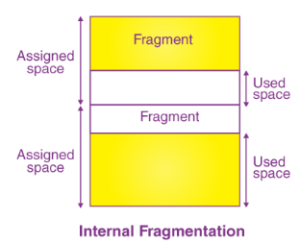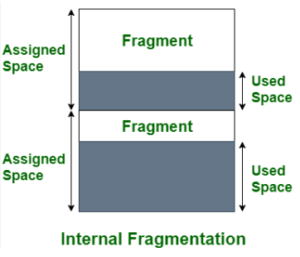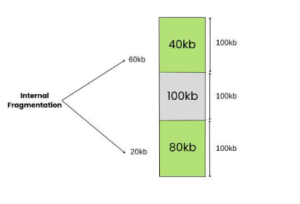Fragmentation in an operating system (OS) happens when files are broken into small pieces and scattered around the storage.
This makes it hard for the OS to quickly find and use these files, slowing down the computer. In this article, we will explore what fragmentation is, how it affects your computer, and ways to fix it.
Read more: Asymptotic Notation and Its Properties
Fragmentation
Fragmentation occurs when a file is divided into smaller pieces and stored in different locations on the hard drive.
This can happen over time as files are created, deleted, and modified. Instead of storing a file in one continuous block, the OS places parts of it wherever there is space.

Types of Fragmentation
There are two main types of fragmentation:
- Internal Fragmentation: This happens when there is unused space within allocated memory blocks. Even though there is enough space, it is not usable because it is within allocated blocks.
- External Fragmentation: This happens when there is enough total free space, but it is spread out in small chunks, making it difficult to store large files.
Effects on Performance
Fragmentation can slow down your computer because the OS has to search multiple locations to read a file.
This means it takes longer to open files, run programs, and even start the computer. Over time, this can make your computer feel sluggish and less responsive.

Defragmentation
Defragmentation is the process of reorganizing the data on your hard drive so that files are stored in continuous blocks.
This makes it easier and faster for the OS to read files. Most operating systems have built-in tools to defragment your hard drive. Running these tools regularly can help keep your computer running smoothly.

Preventing Fragmentation
You can take steps to reduce fragmentation:
- Regular Defragmentation: Use the OS’s defragmentation tool regularly.
- Keep Space Free: Ensure there is always some free space on your hard drive.
- Use SSDs: Solid State Drives (SSDs) are less affected by fragmentation because they have no moving parts and can access data quickly no matter where it is stored.
FAQs
What is fragmentation in OS?
Fragmentation in an OS happens when files are split into pieces and scattered across the hard drive, making it slower to access them.
How does fragmentation affect computer performance?
Fragmentation slows down the computer because the OS has to search different locations to read a file, taking more time.
What is defragmentation?
Defragmentation is the process of reorganizing data on the hard drive so that files are stored in continuous blocks, making it faster for the OS to read them.
How can I prevent fragmentation?
You can prevent fragmentation by regularly defragmenting your hard drive, keeping some free space, and using SSDs instead of traditional hard drives.
Is fragmentation a problem for SSDs?
SSDs are less affected by fragmentation because they have no moving parts and can quickly access data no matter where it is stored.
Conclusion
Fragmentation in an OS can slow down your computer by making it harder for the OS to find and use files. Understanding what fragmentation is and how it affects performance can help you keep your computer running smoothly.
Regular defragmentation and using SSDs can help reduce the impact of fragmentation. By taking these steps, you can ensure your computer stays fast and efficient.








